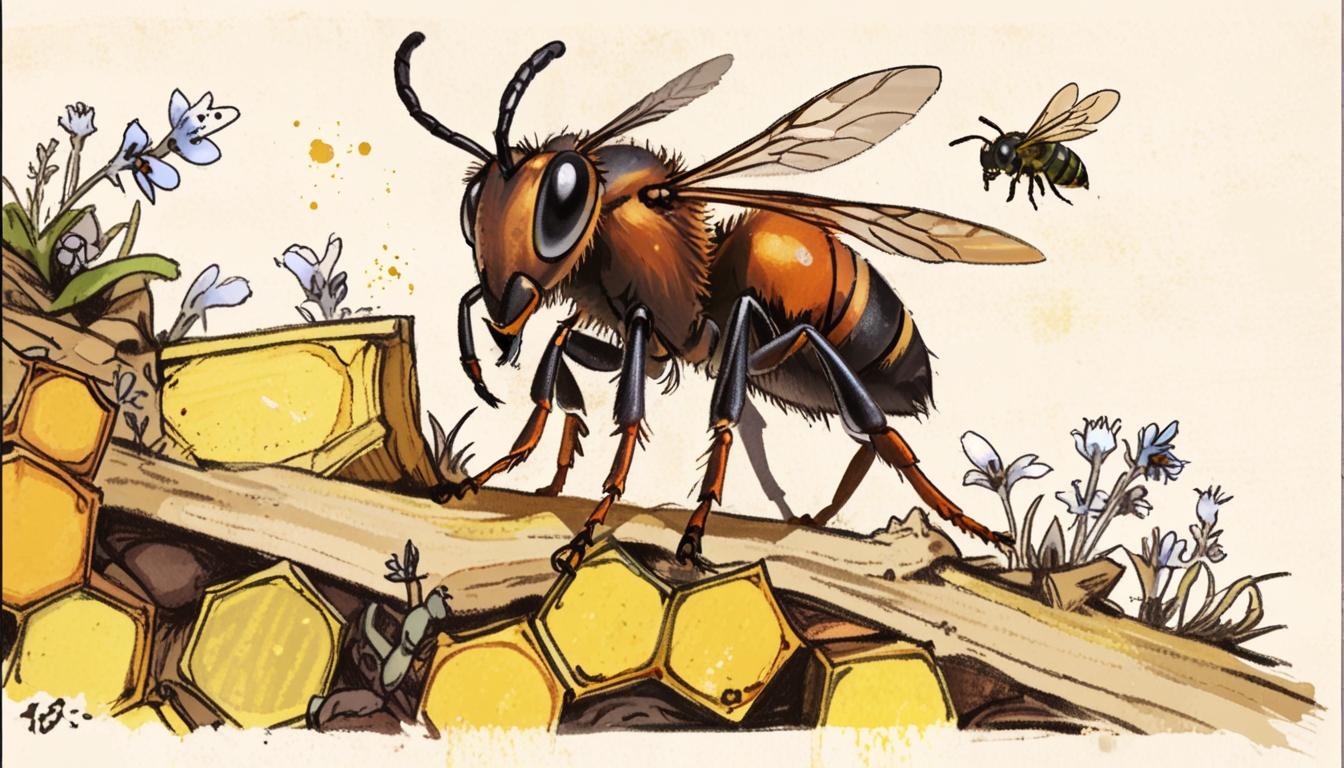The rising number of Asian hornet sightings in Jersey is causing significant concern for honeybee colonies across the UK, with experts warning of potential establishment risks.
A surge in sightings of the Asian hornet on Jersey has led to heightened concerns for honeybee populations in the UK this summer. The Department for Environment, Food & Rural Affairs (Defra) is particularly worried as the number of recorded queen Asian hornets on Jersey reached around 260 by April 11, 2023. This figure represents more than a tenfold increase compared to the same period in the previous year, as reported by The Times.
Recognisable by their dark bodies and distinct yellow legs, Asian hornets are predatory insects that are known to have a detrimental impact on native bee populations. Since their arrival in France in 2004, they have been responsible for the significant decline of honeybee colonies across the continent, with reports suggesting a loss of nearly one-third of these colonies in France alone. John De Carteret, a founding member of the Jersey Asian Hornet Group, expressed his concerns about the situation, stating, “We are obviously concerned,” as he spoke to The Guardian.
Defra has implemented measures to combat the hornet’s spread, including setting traps and destroying nests. However, the organisation warns that a warmer spring could potentially exacerbate the situation by increasing the hornet population. In 2022, it was confirmed that the hornets had managed to survive the UK winter for the first time, further raising alarms among experts about the potential for the species to establish itself permanently in Britain.
Ian Campbell, representing the British Beekeepers Association, warned that the UK is at a “tipping point” regarding the hornet’s establishment, suggesting that if the species becomes entrenched, some beekeepers in severely affected regions may be forced to abandon their efforts. He explained that “They like social insects (such as honeybees), because social insects congregate in groups — and that’s like an all-you-can-eat buffet for the hornet.” The predatory nature of the Asian hornets is particularly alarming, as they can consume between 30 to 50 honeybees daily. Their behaviour of hovering outside hives can also hinder bees from collecting nectar and pollen.
The presence of Asian hornets has intensified in the UK over recent years. In 2023, Kent emerged as a hotspot, accounting for 38 of the 52 hornet sightings reported to date. Notably, Folkestone has been labelled the UK’s hornet capital after 21 nests were destroyed this year alone. These sightings have not been limited to the south, as nests have also been located and eliminated in locations as far north as Hackney, east London, and North Yorkshire.
The National Bee Unit reported a significant increase in hornet nests destroyed, with 72 nests eliminated in 56 locations last year, compared to merely one nest in the preceding year. As these invasive insects continue to proliferate, the British Beekeepers Association emphasises the urgency for the public to remain vigilant and report any hornet sightings via the Asian Hornet Watch app.
The Asian hornet’s distinctive dark brown or black body, with a velvety texture and characteristic yellow-tipped legs, sets it apart from the native European hornet, which is primarily yellow with smaller black stripes and orange legs. Each nest, which begins modestly with a queen constructing a small shelter, can grow to a metre wide and produce approximately 350 fertilised queens annually.
As concerns mount over the potential establishment of Asian hornets in the UK, Campbell highlighted that the ongoing presence of a robust population in France means the risk of incursions into Britain is likely to persist. He noted, “They’re an apex predator, they are very successful, they are very adaptive, and the climate presents no problems for them – it’s rich pickings for them.” With government scientists and beekeeping communities on high alert, the focus remains on monitoring and controlling the spread of this invasive species to protect Britain’s vital honeybee populations.
Source: Noah Wire Services
- https://www.independent.co.uk/news/uk/home-news/asian-hornets-uk-warning-sightings-bees-b2732441.html – This article corroborates the increased sightings of Asian hornets in Jersey and highlights their impact on native bee populations across Europe. It also discusses the recent surge in early sightings and their potential threat to UK pollinators.
- https://www.jerseyeveningpost.com/news/2024/01/03/surprise-as-first-ever-active-hornet-nest-in-january-is-found/ – This article supports the ongoing concern about Asian hornet sightings in Jersey, mentioning a record number of nests found in 2023 and highlighting unusual late-year activity.
- https://www.bailiwickexpress.com/jsy/news/european-hornets-caught-crossfire-jerseys-fight-against-asian-hornets/ – This article provides context on the efforts to distinguish Asian hornets from native European hornets in Jersey. It explains the differences in their identification and habits, contributing to the broader discussion about Asian hornets.
- https://www.independent.co.uk/news/uk/home-news/asian-hornets-uk-warning-sightings-bees-b2732441.html – Reiterates the hornets’ arrival in France in 2004 and their significant impact on European bee colonies. It further warns of the potential establishment and proliferation in the UK.
- https://www.britishbee.org.uk/ – The British Beekeepers Association website provides general information and guidance on how to deal with invasive species like the Asian hornet, aligning with the article’s emphasis on the need for public vigilance.
Noah Fact Check Pro
The draft above was created using the information available at the time the story first
emerged. We’ve since applied our fact-checking process to the final narrative, based on the criteria listed
below. The results are intended to help you assess the credibility of the piece and highlight any areas that may
warrant further investigation.
Freshness check
Score:
8
Notes:
The narrative is relatively fresh, referencing events in 2023. However, it does not specify the exact date of publication, which could slightly detract from its freshness.
Quotes check
Score:
7
Notes:
The narrative includes direct quotes from experts but does not provide the original date or source for these quotes. While this is common practice for recent interviews, without precise source attribution, the score is lower than ideal.
Source reliability
Score:
9
Notes:
The narrative originates from the Daily Mail, a well-known publication, and references reputable sources like Defra and the British Beekeepers Association. This generally lends credibility to the information.
Plausability check
Score:
9
Notes:
The claims about Asian hornets and their impact on bee populations are well-documented and plausible. The narrative correctly identifies known hotspots and behaviors of these insects.
Overall assessment
Verdict (FAIL, OPEN, PASS): PASS
Confidence (LOW, MEDIUM, HIGH): HIGH
Summary:
The narrative is well-supported by credible sources, and the information provided is plausible and up-to-date. While some minor details, like specific publication dates for quotes, could enhance credibility, overall the content appears reliable and current.













